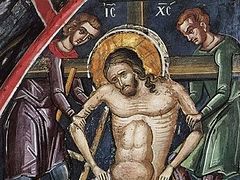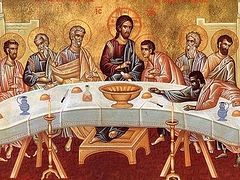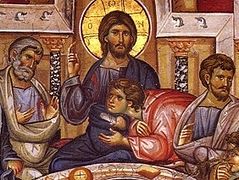On Holy and Great Thursday, we read in the Synaxarion, “The godly Fathers, who have arranged all things well, received from the divine Apostles and the sacred Gospels and in turn handed down to us, that today we should celebrate four things: the sacred Washing of Feet, the Mystical Supper (that is, the tradition of what we know as the awesome Mystery of Holy Communion), the High Priestly Prayer, and finally the betrayal itself.”
When the Lord perceived His hour had come, He ordered the disciples to prepare the upper chamber for the Last and Mystical Supper. First, the Fathers teach us, the Lord washed His disciples’ feet to show them that they had a portion with Him—both in His sufferings and trial and death. Though they would soon scatter in fear, eventually all would meet a violent death, thus consummating their portion with Christ. Then He celebrated the Passover as prescribed by the Law; and immediately He instituted the Liturgy, the Holy Eucharist; that is, He identified His Body and Blood with the basic elements that sustain man: bread and wine. And once the Apostles partook of this Mystical Supper and Communed of Christ’s Body and Blood from His very hands—the hands that fashioned Man—and, after He greatly discoursed with them and expounded on His imminent Passion, referring to Judas as His betrayer, and praying for intimate unity and concord in the Church, He went to Gesthemene, where in great anguish He prayed that this cup may pass, if at all possible.
Christ prayed earnestly to the Father and asked the disciples to watch with Him but one hour. How necessary it is for us to watch with Christ in church during these next days, at the divine services, attentively and with piety; to accompany Him on the way to His Passion. Holy Thursday is a day dedicated to the institution of the Holy Eucharist. On the eve of this day, Matins is served in conjunction with Holy Unction. Holy Unction is served as a healing Mystery, unto the healing of soul and body. This Holy Mystery is not a substitute for Holy Confession, and in fact Holy Confession is a direct prerequisite to it. Holy Unction may be viewed as a final absolution, or an aid by which the faithful may more fully and comprehensively participate in the Holy Eucharist at the Vesperal Liturgy on Holy Thursday morning, at which we are mystically united in a bond of love, and like the Apostles, we dedicate ourselves to Christ who rules over all; we participate like them in that very same Supper, that very same original Eucharist, which is one and the same as ours, unto forgiveness of sins and life everlasting.
The word Eucharist means thanksgiving. Truly, the Church fully expresses herself in the Eucharist, in giving thanks through the remembrance of Christ’s life, death, burial, and finally His Resurrection—the cause of all joy and thanksgiving. Judas, who betrayed Christ, showed ingratitude—as the holy Church sings in the previous days—he is avaricious and jealous, and conspires to betray Christ from ingratitude and malice. We heard the Lord’s preaching to us in the days leading up to this. In essence, Christ is giving us warnings through those last narrated parables—of the Cursing of the Fig Tree, the Ten Virgins with their oil lamps, and the Talents!
He warned us on Holy Tuesday not to be like the blind leaders of the blind, the vain Pharisees. It is pivotally important to not engage in ritualism like them. To be sure, the Orthodox Church is full of rites, and magnificent rites at that; they are life-giving and lead a soul to intimate prayer and communion with God—but only when we are engaged in them properly, with fervor and a right disposition, with thanksgiving, gladness, and charity. He warned us, also on Holy Tuesday, to have our lamps filled and brimming like the five wise virgins. We must flee the conduct of the five foolish virgins. We heard also from the Savior about the Parable of the Talents, and we know well that certain talents—graces or gifts—are entrusted to us. And these must be multiplied. Otherwise, how will the lamps be brimming with oil?
His Eminence Metropolitan Tikhon (Shevkunov) of Pskov teaches us: "People have different talents, but everyone is given the talent of thankfulness.” In other words, we all have the ability to be thankful, to be properly oriented towards and to rightly and worthily participate in the ultimate form of thanksgiving, the Holy Eucharist. This is when the Holy Church gathers and relives the life of Christ, when the Church is mystically translated to that very upper room and participates intimately in that same Mystical Supper. This is why we pray, “At Thy Mystical Supper O Son of God, receive me TODAY as a communicate!” We will not enter the Bridal Chamber if we do not commune with the God-Man; and we will be cursed like the fruitless fig tree that we heard about on Holy Monday.
On Holy Tuesday we sang, Ye have all received equal grace from Christ. It is necessary to invest in this grace, to multiply it, and to be co-workers with each other in the furthering of Christ’s Kingdom here, in this world. Christ prayed for the unity of His disciples; and unfortunately how poignant is this prayer today, in our time. Especially when many within the Orthodox Church (such as those administering the Constantinople Patriarchate) make war on their brethren in Ukraine. Nonetheless, Christ’s words and the example of Judas is before them and us. Everyone has a choice to make during these solemn nights of Christ’s Passion: to turn to Christ and be with Him, or to reject Him as did Judas, the evil disciple.
Tomorrow, on Holy and Great Friday we will follow Christ to Golgotha, and there we will see Him stripped, mocked, and beaten, and finally put to a most grievous death reserved only for the worst malefactors. This is how the thankless ones—those who rejected Christ—repaid Him who led them out of Egypt by His servant Moses, who defended them in the Red Sea after dividing it in two against Pharaoh and his army of charioteers. We also, however, may become “communicants” with Judas and with the Pharisees and Scribes of Israel. And indeed, each time we deny Christ by our actions we edge closer to the lot of those wretched ones. When you find yourself lounging in idleness, think of that magnificent hymn from Holy Tuesday and say with fervor, O Christ the Bridegroom, my soul has slumbered with laziness! And He will give you the strength to be thankful, to be Eucharistic.
At least now, through the moving hymns chanted on these evenings, let us enter into the inner chambers of the heart with thanksgiving to meet the Bridegroom, and to walk with Him to the Cross, to the tomb, and to His Holy Resurrection. He shall surely grant us the grace to be His companions and intimate initiates, just as the Apostles were in the upper room. I pray not for them only, but for those who will believe because of them! Christ said. Can you imagine that at this moment the Lord perceived both you and me, and prayed that our faith would not be shaken when the tempter who sifts men’s souls would come around to create a storm of tempests for us. So therefore, “Come, O Faithful, let us work zealously for the Master. He distributes wealth for His servants.... let one be adorned by wisdom, let another celebrate the Liturgy in beauty... the other communicates the Word to those untaught.”
We have great tasks before us as the Church, for we must transmit this Tradition—this love of the Sacraments and especially the Holy Liturgy, the Holy Eucharist, to the coming generations. This is what tradition means—that which is handed down. “The Bridegroom is more beautiful than all men, and He has invited us to the spiritual banquet of His Chamber.” Without any hesitation, let us hasten to accept such an invitation. If we accept this divine invitation from the depths of our heart, we shall hear His pure voice when we commune of the Holy Mysteries on this sacred and solemn Holy Thursday: Enter thou My servant into the joy of Thy Lord!




